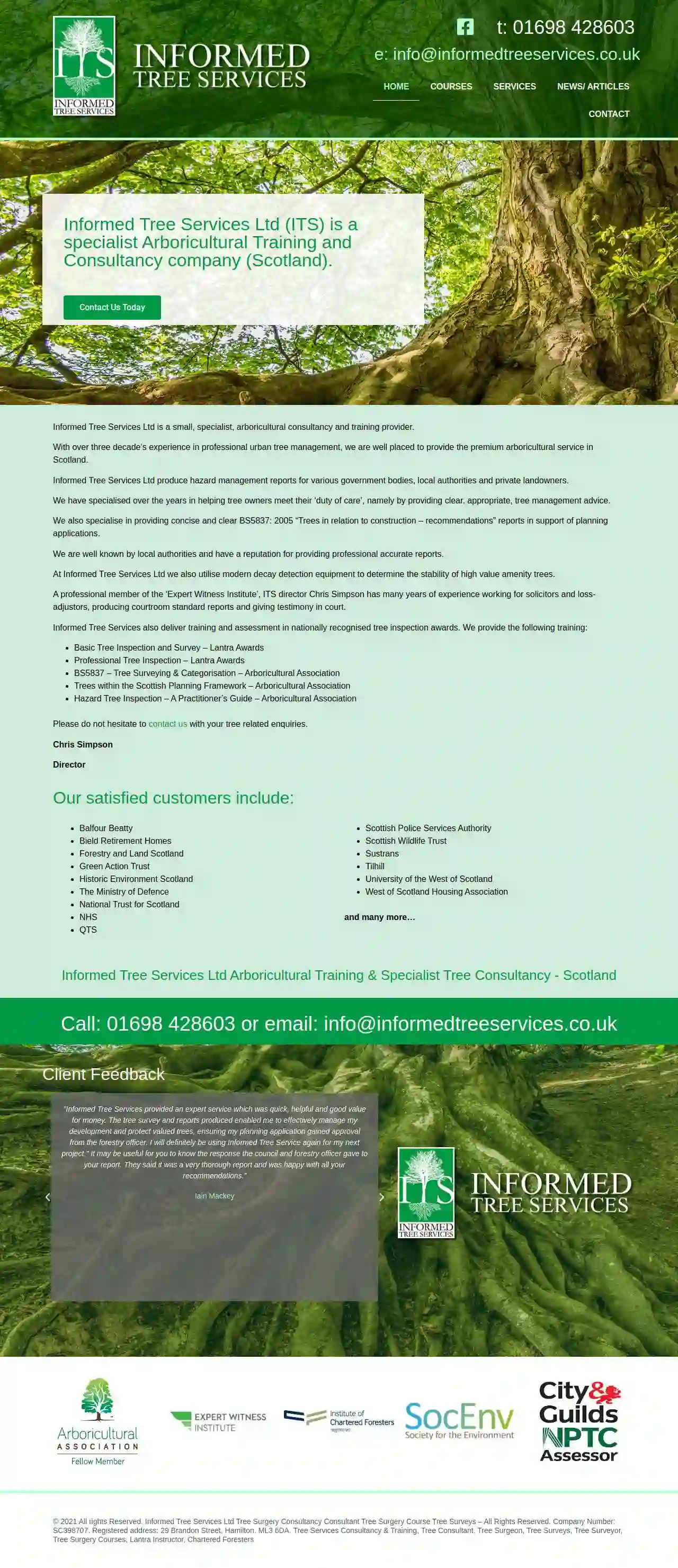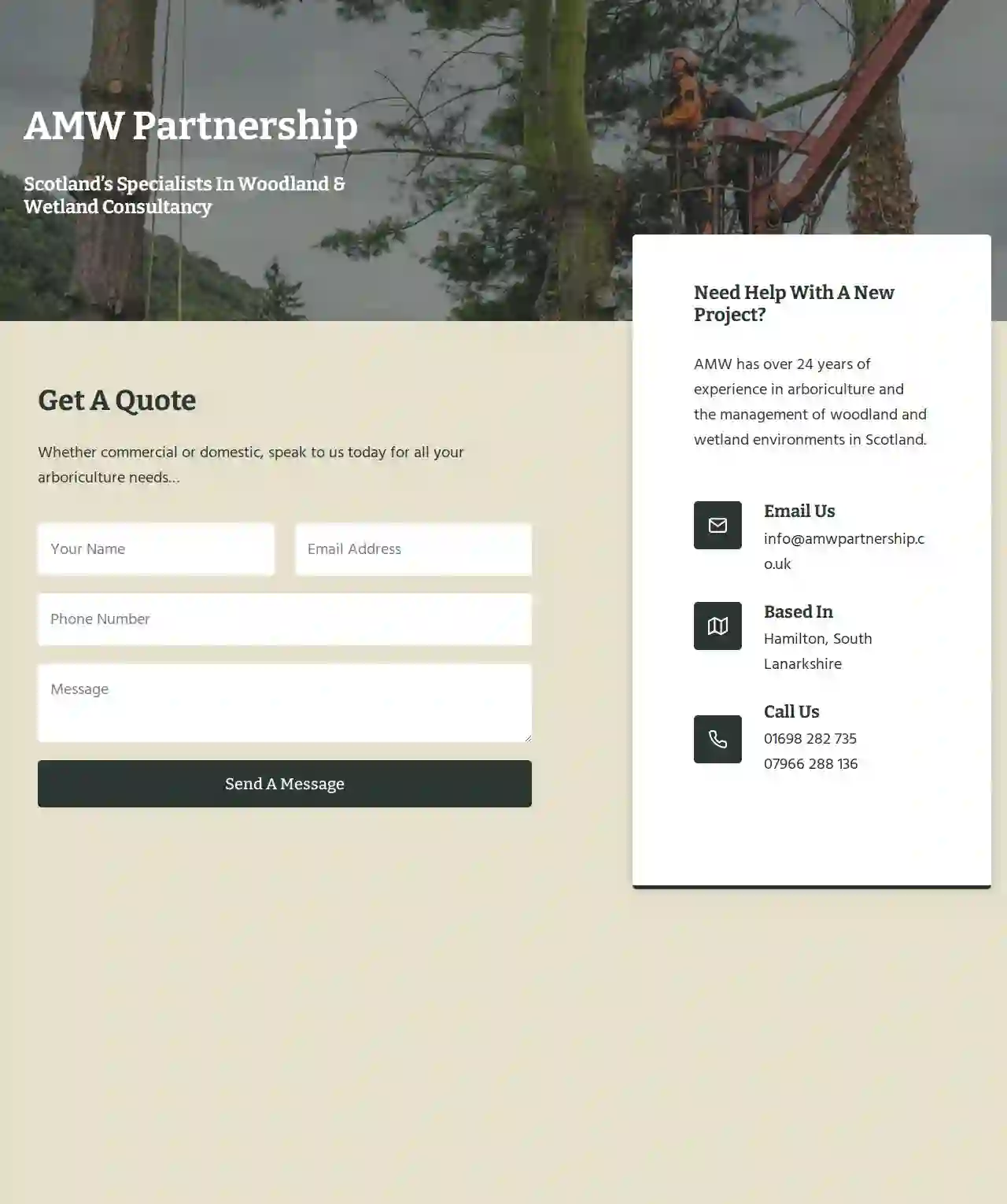Tree Surgeon Law
Best Tree Surgeon in Law
Receive multiple Arborist quotes for your project today! Compare profiles, reviews, accreditations, portfolio, etc... and choose the best service.

Informed Tree Services
55 reviews29 Brandon Street, Hamilton, GBInformed Tree Services Ltd is a specialist Arboricultural Training and Consultancy company (Scotland). With over three decades of experience in professional urban tree management, we are well placed to provide the premium arboricultural service in Scotland. We produce hazard management reports for various government bodies, local authorities and private landowners. We have specialized over the years in helping tree owners meet their 'duty of care', namely by providing clear, appropriate, tree management advice. We also specialize in providing concise and clear BS5837: 2005 'Trees in relation to construction - recommendations' reports in support of planning applications. We are well known by local authorities and have a reputation for providing professional accurate reports. At Informed Tree Services Ltd, we also utilize modern decay detection equipment to determine the stability of high value amenity trees. A professional member of the 'Expert Witness Institute', ITS director Chris Simpson has many years of experience working for solicitors and loss-adjustors, producing courtroom standard reports and giving testimony in court. Informed Tree Services also deliver training and assessment in nationally recognized tree inspection awards.
- Services
- Why Us?
- Accreditations
- Our Team
- Testimonials
- Gallery
Get Quote
Hamilton's Trees & Gardens
516 reviewsHamilton, GBHamilton's Trees & Gardens is a local business dedicated to providing top-notch tree and garden services. We are currently working on a brand new website, but in the meantime, please don't hesitate to get in touch if you have any questions or need our services.
- Services
- Why Us?
- Gallery
Get Quote
AMW Tree Services
Unit 1, 100 Quarry Street, Hamilton, ML3 0AA, GBAMW Partnership is Scotland’s specialists in Woodland & Wetland consultancy. We have over 24 years of experience in arboriculture and the management of woodland and wetland environments in Scotland. Whether commercial or domestic, speak to us today for all your arboriculture needs.
- Services
- Why Us?
Get Quote- J
J Henderson landscaping & tree services
Hamilton, GB- Services
- Why Us?
Get Quote - BR
BRADSHAW HAMILTON
54 reviewsHamilton, GB- Services
- Why Us?
Get Quote - Da
David Hamilton
53 reviewsHamilton, GB- Services
- Why Us?
Get Quote
Over 6,989+ Arborists on our platform
Our tree removal pros operate in Law and surrounding areas!
LocalTreeSurgeon has curated and vetted the Best Arborists in and around Law. Find the most reliable business today.
Frequently Asked Questions About Tree Services
- Tree Protection Zone (TPZ): Establish a designated area around the trees that is off-limits to construction activities. The size of the TPZ depends on the tree's size and species, but generally, it should extend to the drip line (the outermost edge of the tree's canopy).
- Root Protection: Avoid digging, trenching, or compacting the soil within the TPZ. If excavation is necessary, use hand digging or air spading to minimize root disturbance.
- Trunk Protection: Protect tree trunks from damage by wrapping them with protective barriers, such as burlap or plywood.
- Branch Protection: Avoid cutting or damaging branches unless absolutely necessary. If pruning is required, have it done by a certified arborist.
- Watering: Ensure trees receive adequate water during construction, especially if the soil has been disturbed or compacted.
- Monitoring: Regularly monitor trees for signs of stress or damage during and after construction.
- Safety: Felling a tree is extremely dangerous without proper training and equipment. Falling branches or the entire tree can cause serious injury or even death.
- Property Damage: If the tree falls in the wrong direction, it could damage your home, vehicles, or other structures on your property.
- Liability: If you cause damage to your neighbor's property or injure someone while cutting down a tree yourself, you could be held liable.
- Equipment: You'll need to invest in or rent specialized equipment like chainsaws, safety gear, ropes, and potentially a wood chipper.
- Disposal: You'll be responsible for disposing of the tree debris, which can be time-consuming and expensive, especially for large trees.
- Repairs: If the tree falls incorrectly and causes damage, you'll have to cover the cost of repairs.
- Tree Removal: Complete removal of trees, often necessary for diseased, damaged, or hazardous trees.
- Tree Trimming & Pruning: Selective removal of branches to improve tree structure, health, and aesthetics. This includes crown lifting, crown thinning, and crown reduction.
- Stump Removal/Grinding: Removal of tree stumps using specialized grinding equipment, leaving the area level with the ground.
- Tree Planting: Selecting and planting new trees on your property, considering factors like soil type, climate, and available space.
- Tree Cabling & Bracing: Installing support systems for weak or structurally compromised branches to prevent breakage.
- Tree Health Care: Services focused on maintaining or improving the health of your trees, including fertilization, disease diagnosis and treatment, and pest control.
- Emergency Tree Service: Urgent tree care services for situations like storm damage, fallen trees, or hazardous tree removal.
- Experience and qualifications: 'How long have you been in business? Are your arborists certified? What experience do you have with similar projects?'
- Licensing and insurance: 'Are you licensed and insured? Can you provide proof of insurance?'
- Safety practices: 'What safety measures do you take to protect your workers and my property during the project?'
- Cleanup and disposal: 'What will you do with the tree debris after the job? Will you remove the stump and clean up the work area?'
- References: 'Can you provide references from previous clients?'
- Written estimates: 'Can you provide a detailed written estimate outlining the scope of work, costs, and timeframe?'
What is the best way to protect trees during construction?
Is it cheaper to cut down a tree yourself?
Risks:
Costs:
In most cases, the risks and potential costs outweigh any perceived savings from DIY tree removal. Hiring a professional tree service company is the safest and often the most cost-effective option in the long run. They have the experience, equipment, and insurance to handle the job properly and protect you from liability.
What are the different types of tree services offered?
What questions should I ask a tree service company?
What is the best way to protect trees during construction?
- Tree Protection Zone (TPZ): Establish a designated area around the trees that is off-limits to construction activities. The size of the TPZ depends on the tree's size and species, but generally, it should extend to the drip line (the outermost edge of the tree's canopy).
- Root Protection: Avoid digging, trenching, or compacting the soil within the TPZ. If excavation is necessary, use hand digging or air spading to minimize root disturbance.
- Trunk Protection: Protect tree trunks from damage by wrapping them with protective barriers, such as burlap or plywood.
- Branch Protection: Avoid cutting or damaging branches unless absolutely necessary. If pruning is required, have it done by a certified arborist.
- Watering: Ensure trees receive adequate water during construction, especially if the soil has been disturbed or compacted.
- Monitoring: Regularly monitor trees for signs of stress or damage during and after construction.
Is it cheaper to cut down a tree yourself?
Risks:
- Safety: Felling a tree is extremely dangerous without proper training and equipment. Falling branches or the entire tree can cause serious injury or even death.
- Property Damage: If the tree falls in the wrong direction, it could damage your home, vehicles, or other structures on your property.
- Liability: If you cause damage to your neighbor's property or injure someone while cutting down a tree yourself, you could be held liable.
Costs:
- Equipment: You'll need to invest in or rent specialized equipment like chainsaws, safety gear, ropes, and potentially a wood chipper.
- Disposal: You'll be responsible for disposing of the tree debris, which can be time-consuming and expensive, especially for large trees.
- Repairs: If the tree falls incorrectly and causes damage, you'll have to cover the cost of repairs.
In most cases, the risks and potential costs outweigh any perceived savings from DIY tree removal. Hiring a professional tree service company is the safest and often the most cost-effective option in the long run. They have the experience, equipment, and insurance to handle the job properly and protect you from liability.
What are the different types of tree services offered?
- Tree Removal: Complete removal of trees, often necessary for diseased, damaged, or hazardous trees.
- Tree Trimming & Pruning: Selective removal of branches to improve tree structure, health, and aesthetics. This includes crown lifting, crown thinning, and crown reduction.
- Stump Removal/Grinding: Removal of tree stumps using specialized grinding equipment, leaving the area level with the ground.
- Tree Planting: Selecting and planting new trees on your property, considering factors like soil type, climate, and available space.
- Tree Cabling & Bracing: Installing support systems for weak or structurally compromised branches to prevent breakage.
- Tree Health Care: Services focused on maintaining or improving the health of your trees, including fertilization, disease diagnosis and treatment, and pest control.
- Emergency Tree Service: Urgent tree care services for situations like storm damage, fallen trees, or hazardous tree removal.
What questions should I ask a tree service company?
- Experience and qualifications: 'How long have you been in business? Are your arborists certified? What experience do you have with similar projects?'
- Licensing and insurance: 'Are you licensed and insured? Can you provide proof of insurance?'
- Safety practices: 'What safety measures do you take to protect your workers and my property during the project?'
- Cleanup and disposal: 'What will you do with the tree debris after the job? Will you remove the stump and clean up the work area?'
- References: 'Can you provide references from previous clients?'
- Written estimates: 'Can you provide a detailed written estimate outlining the scope of work, costs, and timeframe?'